Rnsg 1443 exam 3 Study guides, Class notes & Summaries
Looking for the best study guides, study notes and summaries about Rnsg 1443 exam 3? On this page you'll find 8 study documents about Rnsg 1443 exam 3.
All 8 results
Sort by
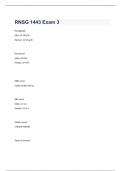
-
RNSG 1443 Exam 3 questions well answered
- Exam (elaborations) • 47 pages • 2024
- Available in package deal
-
- $14.99
- + learn more
RNSG 1443 Exam 3Hemoglobin Men: 14-18 g/dl Women: 12-16 g/dl Hematocrit Male: 42-52% Female: 37-47% WBC count 5,000-10,000 cells/uL RBC count Male: 4.7-6.1 Female: 4.2-5.4 Platelet count 150,000-400,000 Types of anemias 1. Decreased RBC production 2. blood loss anemia 3. increased RBC destruction Anemia clinical manifestations - tachycardia - tachypnea - dyspnea on exertion - pallor, jaundice - headache - vertigo - dizziness - glossitis - hepat...
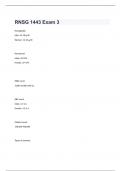
-
RNSG 1443 Exam 3 questions and answers
- Exam (elaborations) • 47 pages • 2024
- Available in package deal
-
- $17.99
- + learn more
RNSG 1443 Exam 3Hemoglobin Men: 14-18 g/dl Women: 12-16 g/dl Hematocrit Male: 42-52% Female: 37-47% WBC count 5,000-10,000 cells/uL RBC count Male: 4.7-6.1 Female: 4.2-5.4 Platelet count 150,000-400,000 Types of anemias
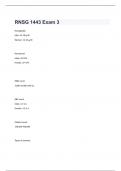
-
RNSG 1443 Exam 3 Question and answers already passed
- Exam (elaborations) • 47 pages • 2024
-
Available in package deal
-
- $13.99
- + learn more
RNSG 1443 Exam 3 Question and answers already passed RNSG 1443 Exam 3 Hemoglobin Men: 14-18 g/dl Women: 12-16 g/dl Hematocrit Male: 42-52% Female: 37-47% WBC count 5,000-10,000 cells/uL RBC count Male: 4.7-6.1 Female: 4.2-5.4 Platelet count 150,000-400,000 Types of anemias
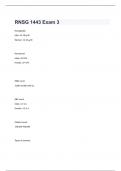
-
RNSG 1443 Exam 3 questions and answers already solved 2024
- Exam (elaborations) • 47 pages • 2024
- Available in package deal
-
- $13.99
- + learn more
RNSG 1443 Exam 3 questions and answers already solved 2024
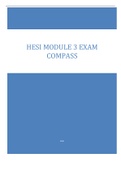
-
HESI MODULE 3 EXAM COMPASS: COMPLEX CONCEPTS OF ADULT HEALTH (RNSG-1443)
- Exam (elaborations) • 38 pages • 2023
-
- $14.99
- + learn more
HESI MODULE 3 EXAM COMPASS: COMPLEX CONCEPTS OF ADULT HEALTH (RNSG-1443) Questions 1.ID: 8The mother of a 3-year-old child tells the nurse that her child hit her doll after the mother scolded her for picking the neighbors’ flowers. Which defense mechanism used by the child does the nurse identify in the mother’s report?......
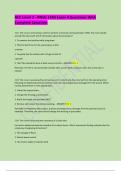
-
ACC Level 2 - RNSG 1443 Exam 4 Questions With Complete Solutions
- Exam (elaborations) • 29 pages • 2024
-
- $7.49
- + learn more
ACC Level 2 - RNSG 1443 Exam 4 Questions With Complete Solutions .515. The nurse is instructing a client to perform a testicular self-examination (TSE). The nurse should provide the client with which information about the procedure? 1. To examine the testicles while lying down 2. That the best time for the examination is after a shower 3. To gently feel the testicle with 1 finger to feel for a growth 4. That TSEs should be done at least every 6 months - ANSWER-515. 2 Rationale: The TSE...
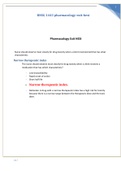
-
RNSG 1443 pharmacology-exit-hesi latest
- Exam (elaborations) • 31 pages • 2023
-
- $12.49
- + learn more
RNSG 1443 pharmacology-exit-hesi Pharmacology Exit HESI Nurse should observe most closely for drug toxicity when a client receivesmed that has what characteristic Narrow therapeutic index The nurse should observe most closely for drug toxicity when a client receives a medication that has which characteristic? • Low bioavailability • Rapid onset of action • Short half life • Narrow therapeutic index. • Rationale: A drug with a narrow therapeutic index has a hig...
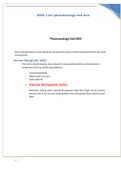
-
RNSG 1443 pharmacology-exit-hesi latest
- Exam (elaborations) • 31 pages • 2023
-
- $12.99
- + learn more
RNSG 1443 pharmacology-exit-hesi Pharmacology Exit HESI Nurse should observe most closely for drug toxicity when a client receivesmed that has what characteristic Narrow therapeutic index The nurse should observe most closely for drug toxicity when a client receives a medication that has which characteristic? • Low bioavailability • Rapid onset of action • Short half life • Narrow therapeutic index. • Rationale: A drug with a narrow therapeutic index has a hig...

Do you wonder why so many students wear nice clothes, have money to spare and enjoy tons of free time? Well, they sell on Stuvia! Imagine your study notes being downloaded a dozen times for $15 each. Every. Single. Day. Discover all about earning on Stuvia


